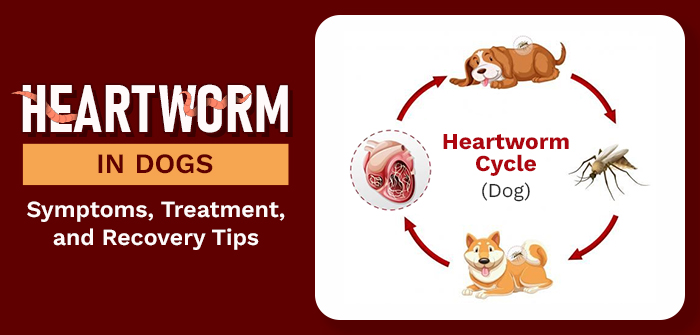Heartworm in Dogs: Symptoms, Treatment, and Recovery Tips
When it comes to keeping canine companions happy and healthy, most dog parents focus on playtime, nutrition, or vet visits. However, it may still leave them vulnerable to internal parasites such as heartworms. These sneaky parasites can silently damage the heart, lungs, and other vital organs, leading to life-threatening conditions if left untreated.
In this blog, we’ll take a deep dive into everything pet parents must know about heartworms in dogs. You learn about the fundamentals, common symptoms, diagnosis, and treatment. Furthermore, we’ve included a care guide to support optimal recovery.
So, stick around till the end!
What is Heartworm Disease in Dogs?
Heartworm disease is a deadly parasitic infection caused by a parasitic worm called Dirofilaria immitis. These worms are transmitted through the bites of infected mosquitoes, and once passed on to the canine, they live inside the dog’s lungs, blood, and heart. Dogs are natural hosts of heartworms, and these parasites can grow up to a foot long, leading to lung damage, heart failure, etc.
What are the Common Symptoms of Heartworms in Dogs?
Being aware of the symptoms of heartworms will help you take proactive action and help your pet better. Pay attention to the following signs:
- Cough
- Weight loss
- Decreased appetite
- Lethargy
- Shortness of breath
- Swollen abdomen
- Exercise intolerance
- Fainting
If you notice your dog’s condition aligning with these symptoms, promptly contact your vet and book an appointment for further diagnosis.
Understanding the Diagnosis of Heartworms in Dogs
The diagnosis of heartworm disease in dogs starts with a physical examination by the vet. They’ll inquire about the symptoms and take a blood sample for the following tests:
Antigen test: This test helps detect the presence of adult female worms in your dog’s blood.
Microfilaria test: This test is done to detect the presence of microfilaria, which are heartworm larvae, in the blood.
Heartworm Treatment and Recovery
The treatment of heartworm in dogs is centered on reducing the symptoms and eliminating all the life stages of heartworm from the dog’s body. To achieve that, the vet may prescribe doxycycline, which is an antibiotic to weaken the adult worms living inside. Then, melarsomine is given to eliminate the adult worms.
Furthermore, the vet will recommend heartworm prevention treatments to keep these nasty parasites at bay. In some cases, they may also recommend some anti-inflammatory treatments. However, the post-heartworm treatment care is where the real effort lies.
Practicing the following measures will support your dog’s optimal recovery.
Restrict their activity
Post-heartworm treatment, it’s crucial to keep the dog calm. So, avoid activities that can raise the heart rate significantly, such as fetching or running. You can also make some modifications in your home, such as installing ramps to help them climb elevated places like beds or couches.
Keep them indoors
Provide them with a comfortable and clean environment and keep them inside as much as possible. Limit their walk time, and when going out for walks, keep them on a leash to avoid sudden bolting away.
Provide necessary stimulation
The restricted activities can get to your dog, and they may resort to destructive behavior due to boredom. Keep them engaged and provide necessary stimulation with interactive toys, puzzles, or something they can chew on.
Manage their diet
It’s crucial to strike a balance in your dog’s diet to ensure optimal nutrition without overfeeding. Keep in mind the activity levels while planning their meals. You can also use interactive or slow feeders to keep them engaged for longer periods.
Administer vet-recommended treatments
Visit the vet regularly and get your dog the right treatments as per the schedule. Also, maintain regular contact with the vet, communicate the changes in your dog’s condition, and take follow-ups.
Popular Heartworm Treatments for Dogs
Apart from the recovery tips mentioned above, you can look into the following heartworm treatments for dog to ensure their safety.
- Nexgard Spectra for Dogs
- Simparica TRIO for Dogs
- Heartgard Plus Chewables for Dogs
- Credelio Plus for Dogs
- Interceptor Spectrum Tasty Chews for Dogs
The Bottom Line
Heartworm in dogs is a serious threat, but with the right knowledge and intent, the condition can be managed very well. We hope this comprehensive guide helped you realise this. With your fundamentals clear about heartworm treatment and recovery, you can navigate the condition better and get your beloved dogs the help they need. Keep in mind the actionable recovery tips shared to help your furry friend bounce back to full strength safely. Good luck!
